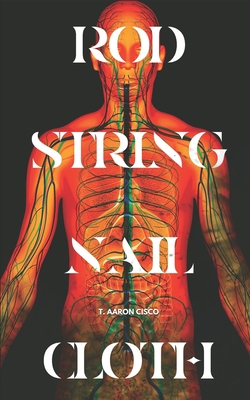Book Review: Rod String Nail Cloth by T. Aaron Cisco
The subtitle of this book is “An Afrofuturist Mixtape.” You can read more about Afrofuturism at this Wikipedia article https://en.wikipedia.org/wiki/Afrofuturism but for the purposes of this review, it’s the intersection of speculative fiction with the African Diaspora experience and cultures, and in particular the experience of African-Americans. This collection of short pieces is very recently published, so let’s take a look.

“Now, Justice” starts off the volume with a story told by a man who kept having his innovative product ideas shot down, only to be adopted shortly thereafter when someone else brought them to market. Which is part of the reason he doesn’t tell anyone in advance about the Veil, a device that allows him to manipulate other people’s sensory perceptions. Instead, he demonstrates its utility with a bit of vigilante justice.
I’m not sure if this was written in response to the murder of George Floyd or before then, since as the narrator points out, police officers killing a black person and facing little to no consequences despite clear evidence and public outcry has been a continuing cycle, and a source of bitterness. And the protests had not even died down last summer before it happened again. It’s easy to understand where the narrator is coming from, even if you might not agree with his actions.
“Thursday Addison” has a cyborg bounty hunter getting overconfident in a post-Singularity future. This reads like a possible first chapter in a longer novel.
“The Hesitant Envoy” is a dialogue, a slight twist on the “one person must defend humanity’s right to continue existing” plotline. Sure, you might be okay if something outside your control killed all the racists, but could you morally justify pulling the trigger yourself?
“The Lydian Mode” is the first of three time travel-related pieces. In this case, an under-appreciated musician has a chance to go where his talents can shine, even if there are other dangers. The opening scene is “soft” racism, where a white bar band wants the protagonist to sit in on a session, not because of his skill with the guitar, but because they’re doing rap covers and need a dark-skinned face in there to lend “credibility.”
“Captain Michaela” is poetry; a starship captain receives a warning message from, supposedly, herself in the future. I appreciate the effort to use rhyme and meter, which makes the poem easier to read.
“Rod String Nail Cloth”, the title story, is about a time traveler trying to send a message to someone left behind. I’m pretty sure the title is a reference I’m not getting. The time traveler is from a post-apocalyptic future which tried to break causality in an attempt to fix the timestream, which may or may not have worked, but made the narrator unstuck in time.
“They Burn So Easily” posits a plague that turns people into “Chalkies”, cannibalistic zombie/vampire beings that are burned by sunlight. The lighter the skin before being diseased, the more likely one is to become a Chalkie. The narrator is trying to escort a Chalkie to a sort of sanctuary for these monsters, but a gang led by a former friend stands in the way. This is another one that comes off as a piece of a longer work.
The self-published first edition could have used another proofreading pass due to spellchecker-proof typos. At one point, a character’s status goes from “active” to “active.”
The lead story is the strongest in the collection, while the Thursday Addison and Chalkie story ideas have potential for much more development and expansion. As a collection, this shows promise, but is a bit underdone, and I look forward to the author’s future work.
Content note: Racism, police brutality, off-stage rape.
Recommended to Afrofuturism fans who want to support new authors.

